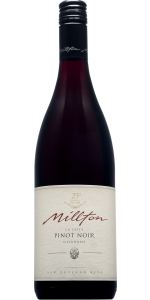
Description
‘La Cote’ is a section of the Clos de Ste Anne vineyard, situated on steep northeast facing slopes in the foothills of Poverty Bay. ‘La Cote’ is home to a collection of modern Pinot Noir clones and like all the Millton vineyards is dry farmed and has been cultivated biodynamically since 1989. I look to the old world for inspiration with Pinot Noir. “I don’t want a big fruit bomb, or a dark wine with blocky oak tannin. I want delicacy and a subtle memory that can accompany aromatic foods with flavour”. A selection of specific slopes and planting comprise our decision as to where to source the fruit from for this wine. The soils comprise dense clay over sandstone, including the surrounding manuka scrubs nearby, giving fruit of smallish bunches and moderate vigour. The grapes are harvested by hand, chilled, sorted and de-stemmed uncrushed into small wooden cuves for prolonged fermentation using natural yeasts. Pressing takes place after one lunar phase. Winemaker Notes: A bright fruited, expressive nose, with notes of dark cherry, juniper berry and an intriguing hint of fennel. There is a savoury taste with firm tannins and ripe fruit finishing with a lively mineral edge to balance. Fined with free range egg whites. Cellaring potential is five years from release.
BioGro Certified Organic Demeter Certified Biodynamic Grown and Bottled on the Property Dry Farmed Carbon Negative
Total acidity: 6.50g/l pH: 3.75 Alcohol: 14.0% Vol Residual Sugar: 1.7 g/l Harvested on: 12th March 2014 Bottled on: 25th June 2015 Released on: 1st August 2015
Certifications
Alcohol
12.5%
Analytical data
dry
Vineyard
‘La Cote’ is a section of the Clos de Ste Anne vineyard, situated on steep northeast facing slopes in the foothills of Poverty Bay. ‘La Cote’ is home to a collection of modern Pinot Noir clones and like all the Millton vineyards is dry farmed and has been cultivated biodynamically since 1989. A selection of specific slopes and planting comprise our decision as to where to source the fruit from for this wine. The soils comprise dense clay over sandstone, including the surrounding manuka scrubs nearby, giving fruit of smallish bunches and moderate vigour.


